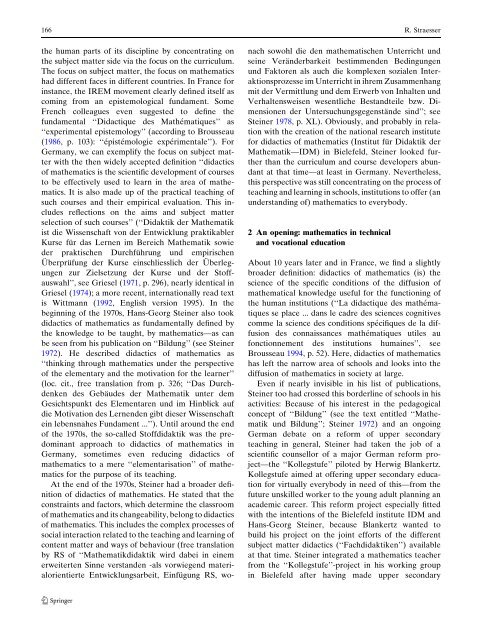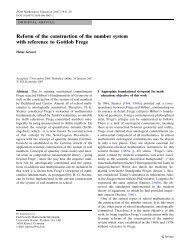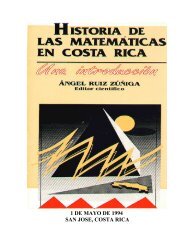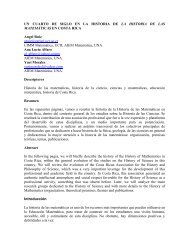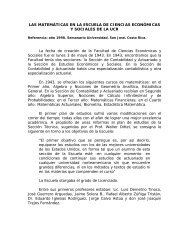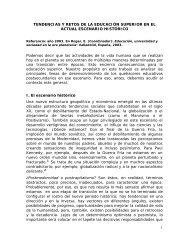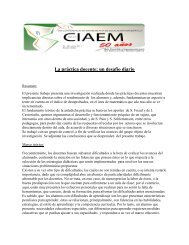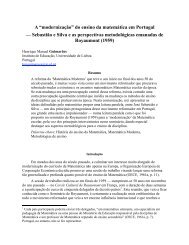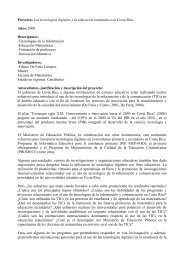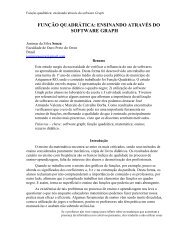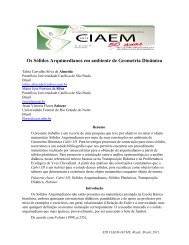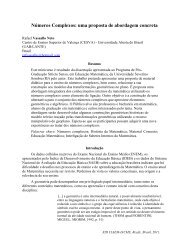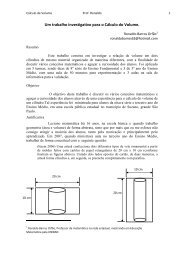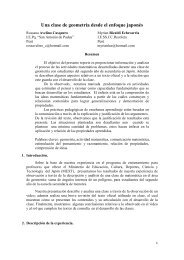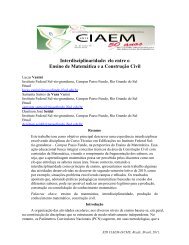Didactics of mathematics: more than mathematics and school! - CIMM
Didactics of mathematics: more than mathematics and school! - CIMM
Didactics of mathematics: more than mathematics and school! - CIMM
Create successful ePaper yourself
Turn your PDF publications into a flip-book with our unique Google optimized e-Paper software.
166 R. Straesser<br />
the human parts <strong>of</strong> its discipline by concentrating on<br />
the subject matter side via the focus on the curriculum.<br />
The focus on subject matter, the focus on <strong>mathematics</strong><br />
had different faces in different countries. In France for<br />
instance, the IREM movement clearly defined itself as<br />
coming from an epistemological fundament. Some<br />
French colleagues even suggested to define the<br />
fundamental ‘‘Didactique des Mathématiques’’ as<br />
‘‘experimental epistemology’’ (according to Brousseau<br />
(1986, p. 103): ‘‘épistémologie expérimentale’’). For<br />
Germany, we can exemplify the focus on subject matter<br />
with the then widely accepted definition ‘‘didactics<br />
<strong>of</strong> <strong>mathematics</strong> is the scientific development <strong>of</strong> courses<br />
to be effectively used to learn in the area <strong>of</strong> <strong>mathematics</strong>.<br />
It is also made up <strong>of</strong> the practical teaching <strong>of</strong><br />
such courses <strong>and</strong> their empirical evaluation. This includes<br />
reflections on the aims <strong>and</strong> subject matter<br />
selection <strong>of</strong> such courses’’ (‘‘Didaktik der Mathematik<br />
ist die Wissenschaft von der Entwicklung praktikabler<br />
Kurse für das Lernen im Bereich Mathematik sowie<br />
der praktischen Durchführung und empirischen<br />
Überprüfung der Kurse einschliesslich der Überlegungen<br />
zur Zielsetzung der Kurse und der St<strong>of</strong>fauswahl’’,<br />
see Griesel (1971, p. 296), nearly identical in<br />
Griesel (1974); a <strong>more</strong> recent, internationally read text<br />
is Wittmann (1992, English version 1995). In the<br />
beginning <strong>of</strong> the 1970s, Hans-Georg Steiner also took<br />
didactics <strong>of</strong> <strong>mathematics</strong> as fundamentally defined by<br />
the knowledge to be taught, by <strong>mathematics</strong>—as can<br />
be seen from his publication on ‘‘Bildung’’ (see Steiner<br />
1972). He described didactics <strong>of</strong> <strong>mathematics</strong> as<br />
‘‘thinking through <strong>mathematics</strong> under the perspective<br />
<strong>of</strong> the elementary <strong>and</strong> the motivation for the learner’’<br />
(loc. cit., free translation from p. 326; ‘‘Das Durchdenken<br />
des Gebäudes der Mathematik unter dem<br />
Gesichtspunkt des Elementaren und im Hinblick auf<br />
die Motivation des Lernenden gibt dieser Wissenschaft<br />
ein lebensnahes Fundament ...’’). Until around the end<br />
<strong>of</strong> the 1970s, the so-called St<strong>of</strong>fdidaktik was the predominant<br />
approach to didactics <strong>of</strong> <strong>mathematics</strong> in<br />
Germany, sometimes even reducing didactics <strong>of</strong><br />
<strong>mathematics</strong> to a mere ‘‘elementarisation’’ <strong>of</strong> <strong>mathematics</strong><br />
for the purpose <strong>of</strong> its teaching.<br />
At the end <strong>of</strong> the 1970s, Steiner had a broader definition<br />
<strong>of</strong> didactics <strong>of</strong> <strong>mathematics</strong>. He stated that the<br />
constraints <strong>and</strong> factors, which determine the classroom<br />
<strong>of</strong> <strong>mathematics</strong> <strong>and</strong> its changeability, belong to didactics<br />
<strong>of</strong> <strong>mathematics</strong>. This includes the complex processes <strong>of</strong><br />
social interaction related to the teaching <strong>and</strong> learning <strong>of</strong><br />
content matter <strong>and</strong> ways <strong>of</strong> behaviour (free translation<br />
by RS <strong>of</strong> ‘‘Mathematikdidaktik wird dabei in einem<br />
erweiterten Sinne verst<strong>and</strong>en -als vorwiegend materialorientierte<br />
Entwicklungsarbeit, Einfügung RS, wonach<br />
sowohl die den mathematischen Unterricht und<br />
seine Veränderbarkeit bestimmenden Bedingungen<br />
und Faktoren als auch die komplexen sozialen Interaktionsprozesse<br />
im Unterricht in ihrem Zusammenhang<br />
mit der Vermittlung und dem Erwerb von Inhalten und<br />
Verhaltensweisen wesentliche Best<strong>and</strong>teile bzw. Dimensionen<br />
der Untersuchungsgegenstände sind’’; see<br />
Steiner 1978, p. XL). Obviously, <strong>and</strong> probably in relation<br />
with the creation <strong>of</strong> the national research institute<br />
for didactics <strong>of</strong> <strong>mathematics</strong> (Institut für Didaktik der<br />
Mathematik—IDM) in Bielefeld, Steiner looked further<br />
<strong>than</strong> the curriculum <strong>and</strong> course developers abundant<br />
at that time—at least in Germany. Nevertheless,<br />
this perspective was still concentrating on the process <strong>of</strong><br />
teaching <strong>and</strong> learning in <strong>school</strong>s, institutions to <strong>of</strong>fer (an<br />
underst<strong>and</strong>ing <strong>of</strong>) <strong>mathematics</strong> to everybody.<br />
2 An opening: <strong>mathematics</strong> in technical<br />
<strong>and</strong> vocational education<br />
About 10 years later <strong>and</strong> in France, we find a slightly<br />
broader definition: didactics <strong>of</strong> <strong>mathematics</strong> (is) the<br />
science <strong>of</strong> the specific conditions <strong>of</strong> the diffusion <strong>of</strong><br />
mathematical knowledge useful for the functioning <strong>of</strong><br />
the human institutions (‘‘La didactique des mathématiques<br />
se place ... dans le cadre des sciences cognitives<br />
comme la science des conditions spécifiques de la diffusion<br />
des connaissances mathématiques utiles au<br />
fonctionnement des institutions humaines’’, see<br />
Brousseau 1994, p. 52). Here, didactics <strong>of</strong> <strong>mathematics</strong><br />
has left the narrow area <strong>of</strong> <strong>school</strong>s <strong>and</strong> looks into the<br />
diffusion <strong>of</strong> <strong>mathematics</strong> in society at large.<br />
Even if nearly invisible in his list <strong>of</strong> publications,<br />
Steiner too had crossed this borderline <strong>of</strong> <strong>school</strong>s in his<br />
activities: Because <strong>of</strong> his interest in the pedagogical<br />
concept <strong>of</strong> ‘‘Bildung’’ (see the text entitled ‘‘Mathematik<br />
und Bildung’’; Steiner 1972) <strong>and</strong> an ongoing<br />
German debate on a reform <strong>of</strong> upper secondary<br />
teaching in general, Steiner had taken the job <strong>of</strong> a<br />
scientific counsellor <strong>of</strong> a major German reform project—the<br />
‘‘Kollegstufe’’ piloted by Herwig Blankertz.<br />
Kollegstufe aimed at <strong>of</strong>fering upper secondary education<br />
for virtually everybody in need <strong>of</strong> this—from the<br />
future unskilled worker to the young adult planning an<br />
academic career. This reform project especially fitted<br />
with the intentions <strong>of</strong> the Bielefeld institute IDM <strong>and</strong><br />
Hans-Georg Steiner, because Blankertz wanted to<br />
build his project on the joint efforts <strong>of</strong> the different<br />
subject matter didactics (‘‘Fachdidaktiken’’) available<br />
at that time. Steiner integrated a <strong>mathematics</strong> teacher<br />
from the ‘‘Kollegstufe’’-project in his working group<br />
in Bielefeld after having made upper secondary<br />
123


